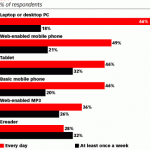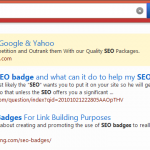If your are an in-house SEO department or an agency, SEO from an enterprise level is always going to be challenging The challenges need to be understood before you can overcome them and be as productive as possible. Let’s talk about some of the main ones:
- Education of SEO – Executives love the results of SEO but have very little understanding of the investment that is needed to succeed. If you ar an agency, you tend to be more always chasing the “why do we need them, we can do this in-house”. If you are in-house, you have a ton of competition with other media sources like paid search, email, media buying, affiliates, etc.
 You also have to deal with “to many cooks in the kitchen” where everyone has a piece of the responsibility. From technical and architectural upkeep, content writing and creation, design, social media, press, are great examples. With all of these influences, you can bet disagreements will happen. This is where you need to be an expert in educating all. Honestly, it does not take much to do this but it is time consuming. Quick presentations, links to specific articles that you put company specifics to, and showcasing competitive SEO strategy (and results) will do this.
You also have to deal with “to many cooks in the kitchen” where everyone has a piece of the responsibility. From technical and architectural upkeep, content writing and creation, design, social media, press, are great examples. With all of these influences, you can bet disagreements will happen. This is where you need to be an expert in educating all. Honestly, it does not take much to do this but it is time consuming. Quick presentations, links to specific articles that you put company specifics to, and showcasing competitive SEO strategy (and results) will do this. - Lack of solid teamword – We all know everyone is busy and they are not just sitting around waiting for SEO to come up with tasks that need to be completed. We also have different KPIs to hit. Each one has explicit metrics and goals that they must hit annually so as to be presumed successful in their position. These goals and metrics don’t always align cross-departmentally, which can lead to things not being done that would help what everybody’s final goal should be – increase income or business price for the company. An instance of this is when the SEO team knows that there are basic issues with the site that are prohibiting it from ranking as well as it might , for example non-original content. Because they rely without delay on the Information Technology department to carry out code changes like redirects, canonical tags, country-specific XML sitemaps, etc.
Solving These SEO Challenges
Communication plain and simple – What makes SEO so challenging is that your results (and worth) is based on others. You need overall buy-in for all factors within a company. An occasional email won’t cut it. You need to be able to have open discussions with all facets of an organization including with higher and upper management, with promoting departments, I. T. departments, content writers, branding groups. The list could go on. The point is you must create an environment where SEO is a company-wide adoption where everybody understands its goals and how their individual roles can and do at once influence organic search performance and in turn company performance.
I like to have customized meetings that include easy to understand graphics and presentations to show results, reports promoting the work you have done and the results you have achieved. In the final analysis you need to be pro-active in promoting the value of SEO. I have found success by using WebMaster Tool results to show the impact of work done and then having open discussions with that department on what their ideas are to continue the momentum.
If the client is really big, I highly recommended an SEO project manager, who’s sole job is communication. Marketing team rarely have SEO on the top of mind so it is really important to have that “face” within that team.





















Stay Connected With Us: